When purchasing a washing machine, we want it to serve us for more than one year, and when buying a washing machine from the premium segment, our expectations are even higher. Agree that having paid a lot of money for this miracle of technology, we would not want to send it to a landfill due to the fact that bad water in our taps simply destroyed it. Unfortunately, not many use a water filter for a washing machine, believing that this is a worthless invention that you can do without.
Really, a washing machine without an additional filter can work very well, but the water in our taps is often of very poor quality, so the washing machine will become worse and worse over time, and later may break down.
The water contains various impurities, rust from old pipes, in some regions of the country the water can be "hard". All this contributes to the fact that during its heating a chemical reaction will occur, as a result of which plaque will form on the heating element and the drum of the washing machine. Also, such particles help the pump fail faster, thereby reducing its service life.
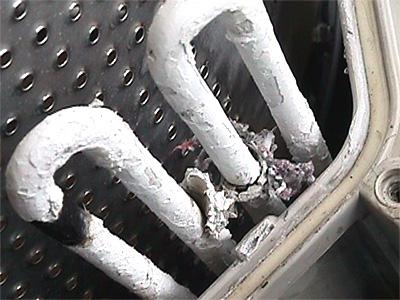
We have already written about how to clean a washing machine from scale, but if you want to keep the details of your machine for a longer period, as well as improve the quality of washing, then it is best to use water filters.
In many washing machines, the manufacturer has provided a standard small filter for coarse water purification from large particles. Usually, it stands in the place where the inlet hose is screwed to the washing machine.
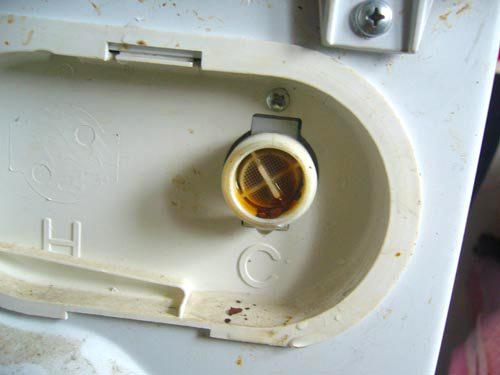
It is a small fine mesh, like the one through which we filter the broth. Over time, it becomes clogged and needs to be cleaned. But, unfortunately, it prevents the ingress of large particles, rust or sand. Small particles still get into the tank.
Exactly because of this reason some owners of this equipment prefer to use an additional water filter for washing machines.
Types of water filters for washing machines
Since such devices are becoming more and more popular, the offers for them are also expanding, so there are several types of filters for washing machines on the market today. Let's look at them all in order.
Main water filter
This type of filter does not apply directly to washing machines, it is placed on the inlet main pipeline and purifies all the water that enters the apartment or house. Accordingly, the washing machine also receives water purified by this filter.
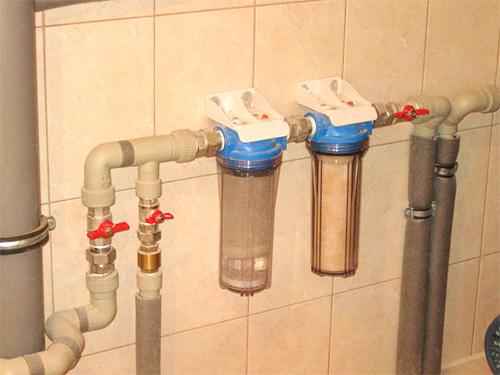
The task of the main filter is to purify water from impurities, such as rust or sand. It does not change the chemical composition of water. If you have "hard" water, then after this filter it will remain so. Very often, due to impurities of rust and dirt in the water, the mesh filter in the washing machine is clogged, which leads to the fact that the washing machine does not wash all the powder from the tray.
Washing machine coarse filter
If you do not have a main filter at the water inlet to the apartment, then it is best to put a filter in front of the machine itself, which will clean the water from all kinds of particles, that is, perform the function of the main one. Such filters can serve as filters like the main ones, but with a smaller diameter.
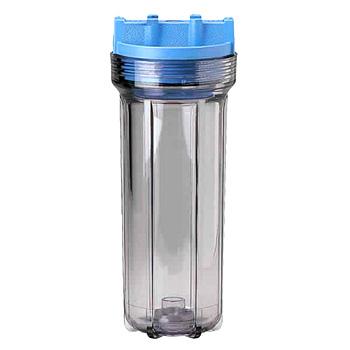
After such filters, you should already soften the water, provided that it is “hard” for you.
Polyphosphate filter
This is a filter that is just designed to soften water. If you are facing a problem hard terry towels after washing, then this filter is able to reduce this effect.It is a flask that contains sodium polyphosphate - a substance similar to salt. When passing through this filter, the substances that form scale are enveloped by polyphosphate molecules and do not form scale during the heating process.
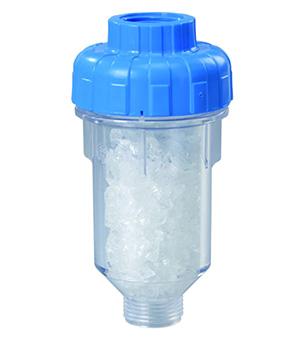
Maintaining such a filter is quite simple - you need to pour the active substance into the flask from time to time, which you can do yourself. The cost of a polyphosphate filter is also not high, so almost everyone can buy it.
Magnetic water filter
It is also a filter that is designed to soften water. Such a filter is mounted directly on top of the hose and acts on the water with a magnetic field.
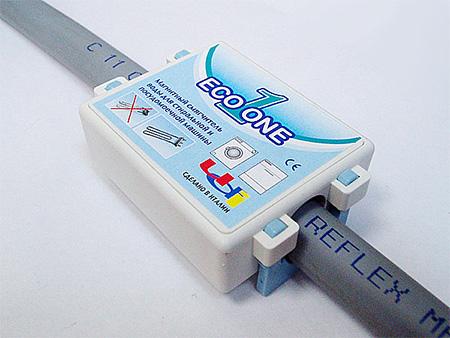
Manufacturers claim that, passing through such a filter, the water softens under the influence of a magnetic field. But it is difficult to come up with any serious and more detailed explanations for this device.Therefore, we are skeptical about magnetic filters.
Installing a washing machine filter
How to install a water filter on a washing machine? In fact, everything is quite simple.
Installation of the main filter
The main filter is placed after the water meter and the tap, which shuts off the water supply to the entire apartment or house. To do this, the pipe is cut, and a filter is screwed into the gap.
Installing a cleaning filter for a washing machine
This filter is installed directly in front of the washer itself. In the pipe, a conclusion is made under the washing machine with a faucet; then a filter is placed, and the unit itself is directly connected to it.
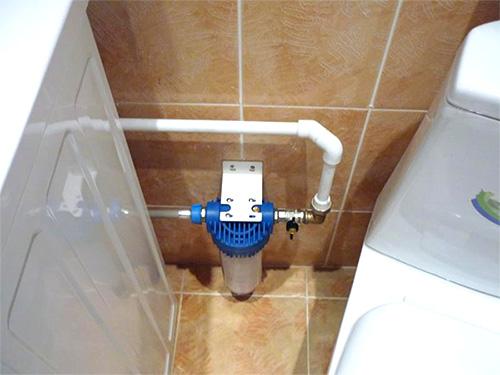
Installing a polyphosphate filter
This filter is installed similarly to the previous one. It goes right in front of the washing machine. Its dimensions are quite small, so its installation is quite simple and not laborious. You can probably install it yourself.
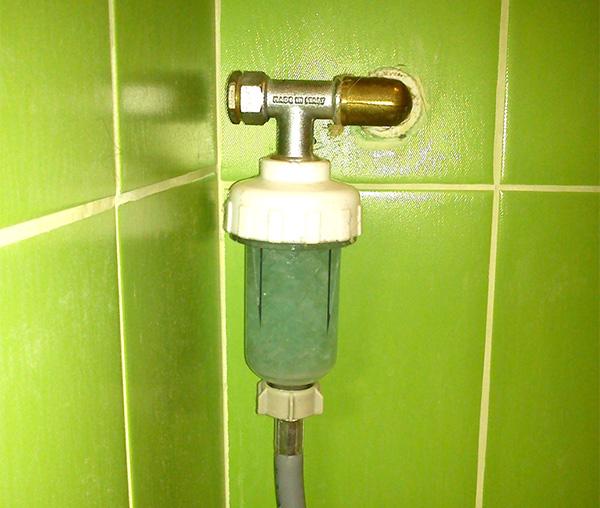
Installing a magnetic water softener
This “filter” does not require any disassembly and alteration of existing communications at all, since it is simply attached to the washing machine hose with bolts and a screwdriver.
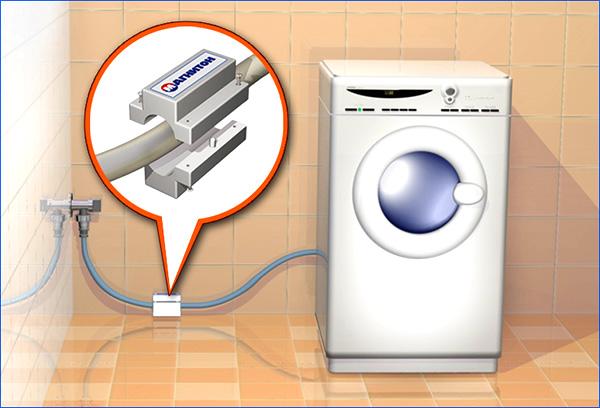
Which filter to choose
In order to decide which filter to choose for a washing machine, you first need to hand over the water for analysis, and only after that, depending on the presence of certain substances in it, choose a filter. But in short, we will explain how to choose a water filter for a washing machine.
If your water has a lot of dirt, rust and other impurities that precipitate, then we definitely recommend that you install a main filter for the entire apartment, if possible.If this is not possible, but you want all this muck not to get into the washing machine, then put such a filter in front of the washing machine.
If you have hard water, and this happens quite often in our country, then you will need a water softener. Therefore, put a polyphosphate water filter in front of the washing machine. Or, if you trust marketers, you can put a magnetic filter.
As a result, ideally, you should get two filters for the washing machine:
- The first removes all impurities from the water - sand, rust, dirt.
- The second softens the water.
But again, we repeat, in order not to waste time and money on installing unnecessary filters, it is best to hand over the water for analysis, and then make a decision.

Comments
I add 9% vinegar or citric acid to the tray. There is an effect.